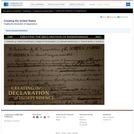
Connect particular phrases and ideas set down in the Declaration of Independence with texts that preceded it.
- Subject:
- History
- U.S. History
- Material Type:
- Activity/Lab
- Provider:
- Library of Congress
- Date Added:
- 02/16/2011

Connect particular phrases and ideas set down in the Declaration of Independence with texts that preceded it.
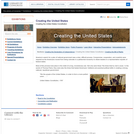
Connect particular phrases and ideas set down in the Constitution with texts that preceded it.
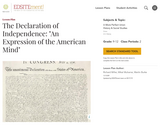
This lesson plan looks at the major ideas in the Declaration of Independence, their origins, the Americans' key grievances against the King and Parliament, their assertion of sovereignty, and the Declaration's process of revision.
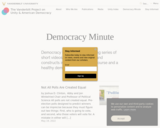
Democracy Minutes are a growing series of short videos that explain topics and constructs important to civil discourse and a healthy democracy. This video series is created by the Vanderbilt Project on Unity and American Democracy, which elevates the role of research and evidence-based reasoning into the national conversation. Drawing on original content anchored on facts and evidence, the Project seeks to make a meaningful contribution to bridging America’s deepest differences.

This is an advanced seminar that will analyze the effectiveness of development and planning theories from the perspective of practitioners who implement projects and policies based on such theories. The ultimate goal is to create new planning sensibilities, which theorize from practice, not the other way around.
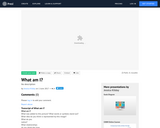
This is a color lithograph printed in 1861 showing the federal structure of government. The primary source has been divided into small pieces and used in a Prezi presentation. The purpose is to allow students to focus on small details of the primary source to draw conclusions that are guided by thinking questions included in the presentation. As a conclusion, students should be able to understand the overall concept illustrated by the diagram, which is the federal structure of government.
This work is licensed under a Creative Commons Attribution 4.0 International License.

Is international trade good for Americans? The November 2017 issue of Page One Economics provides the ins and outs of trade, including some history, the costs and benefits, and policy choices.
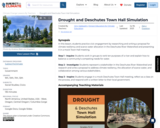
SYNOPSIS: In this lesson, students practice civic engagement by researching and writing a proposal for climate resiliency and scarce water allocation in the Deschutes River Watershed and presenting it in a mock Town Hall meeting.
SCIENTIST NOTES: The lesson allows students to propose ways to solve water scarcity in their local communities and engage with key stakeholders and policymakers to design policies that will enable local communities in Oregon to manage their water resources while building their resilience to climate change. The lesson and all the accompanying materials were reviewed and are suitable for teaching.
POSITIVES:
-Students engage in a mock Town Hall and learn how to build community while voicing community concerns.
-Students practice listening skills and engage in discourse over an important issue.
-Students learn to collaborate with different stakeholders and diverse voices, working together to find a solution that best fits a community.
-Students practice using local research to support their ideas.
-Students learn to write and present a proposal.
-The lesson can be spread out over two to four days, with a full day for research, a full day for the Town Hall, a day for voting or decision-making, and a day for letter writing and sharing in the class.
ADDITIONAL PREREQUISITES:
-Students should have an understanding of media literacy and best research practices.
-Students should have a basic understanding of rhetorical structure and devices for persuasion in oral delivery techniques.
-Teachers should review the general overview and agenda in the Town Hall Guide and make adjustments as needed.
-You will need to make a copy of the Student Slideshow for each group of students and grant them editing rights before the lesson. Students will be writing in the Student Slideshow.
DIFFERENTIATION:
-Students with little experience in persuasive speaking could use some instruction on rhetorical methods and devices using these resources:
-41 Rhetorical Devices That Will Make Your Words Memorable
-How to Use Rhetoric to Get What You Want
-PBS Literary Elements & Techniques: Imagery and Figurative Language.
-Students could develop their research into a Community Action Project proposing policy to actual stakeholders.
-Students could connect with local stream restoration projects or organizations as a hands-on learning experience.
-Students could lead a school community education campaign to spread awareness of water-saving techniques.
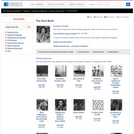
A selection of Library of Congress primary sources exploring the The Great Depression and World War II (1929-1945). This set also includes a Teacher's Guide with historical context and teaching suggestions.
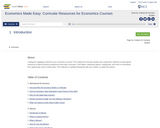
Looking for engaging content for your economics courses? The Institute for Humane Studies has curated this collection of educational resources to help economics professors enrich their curriculum. Find videos, interactive games, reading lists, and more on everything from opportunity costs to trade policy. This collection is updated frequently with new content, so watch this space!

Years ago, airline passengers enjoyed more legroom and in-flight extras—for a price. Find out in the November 2018 issue of Page One Economics how deregulation increased competition, lowered prices, and created crowded flights.
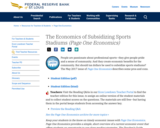
People are passionate about professional sports—they give people pride and a sense of community. And they create economic benefits for the community. But should tax dollars be used to subsidize sports stadiums? The May 2017 issue of Page One Economics describes some pros and cons.
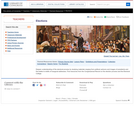
This site looks at American political parties of the past, presidential inaugurations, images of presidents and first ladies, our first uniform election day, political cartoons by Herbert Block (Herblock) and Pat Oliphant, the 1877 electoral commission created by Congress to resolve the disputed presidential election of 1876, the 19th and 24th amendments (ending the poll tax and giving women the right to vote), and the Nixon-Kennedy debates.

It is important to educate future voters about the issues, processes, and impacts of voting in elections. These resources include links to lesson plans, videos, games, and printables to assist teachers K—12 to promote civic participation and voting.
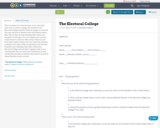
This is a project we created as part of our education class. In it, is a way to engage the students in the Electoral College and have them do a paper to research the topic and how it related to the United States today. Now only do they do deep thinking about their own thoughts on this topic, but can compare and contrast today's America with late 18th century America and form ideas based on these two eras. It gets the students to debate each other, while also getting to see what the Founders were thinking when they created the Electoral College and whether it applies today or not, meaning that they can study the Constitution as well, and develop thought on whether they think it should be taken liberally or more strictly.

An historical overview of the origins of the U.S. Electoral College
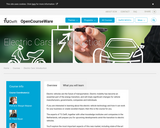
Electric vehicles are the future of transportation. Electric mobility has become an essential part of the energy transition, and will imply significant changes for vehicle manufacturers, governments, companies and individuals.
If you are interested in learning about the electric vehicle technology and how it can work for your business or create societal impact, then this is the course for you.
The experts of TU Delft, together with other knowledge institutes and companies in the Netherlands, will prepare you for upcoming developments amid the transition to electric vehicles.
You’ll explore the most important aspects of this new market, including state-of-the-art technology of electric vehicles and charging infrastructure; profitable business models for electric mobility; and effective policies for governmental bodies, which will accelerate the uptake of electric mobility.
The course includes video lectures, presentations and exercises, which are all reinforced with real-world case studies from projects that were implemented in the Netherlands.

This resource is a video abstract of a research paper created by Research Square on behalf of its authors. It provides a synopsis that's easy to understand, and can be used to introduce the topics it covers to students, researchers, and the general public. The video's transcript is also provided in full, with a portion provided below for preview:
"On-the-job training is critical to any enterprise But how and why employers train employees remains something of a mystery especially in Australia, where research on the subject appears outdated To provide a fresh look, researchers surveyed employers across several industries including government and community services retail and manufacturing Reasons for training seemed to agree with findings reported in older studies But some new trends emerged such as an accelerated need to master new technologies and an increased focus on business strategy— indications of a continuously changing workplace across the board And while financial constraints present a major barrier to training, companies report doing more training than they did five years ago with the amount of training not necessarily linked to the size of an organization Although comparative studies with other countries are needed to tease out further trends these findings could help organizations make more cost-effective decis.."
The rest of the transcript, along with a link to the research itself, is available on the resource itself.

The 11th grade learning experience consists of 7 mostly month-long units aligned to the Common Core State Standards, with available course material for teachers and students easily accessible online. Over the course of the year there is a steady progression in text complexity levels, sophistication of writing tasks, speaking and listening activities, and increased opportunities for independent and collaborative work. Rubrics and student models accompany many writing assignments.Throughout the 11th grade year, in addition to the Common Read texts that the whole class reads together, students each select an Independent Reading book and engage with peers in group Book Talks. Students move from learning the class rituals and routines and genre features of argument writing in Unit 11.1 to learning about narrative and informational genres in Unit 11.2: The American Short Story. Teacher resources provide additional materials to support each unit.

In this unit, students will take a look at the historical vision of the American Dream as put together by our Founding Fathers. They will be asked: How, if at all, has this dream changed? Is this dream your dream? First students will participate in an American Dream Convention, acting as a particular historical figure arguing for his or her vision of the American Dream, and then they will write an argument laying out and defending their personal view of what the American Dream should be.
ACCOMPLISHMENTS
Students read and annotate closely one of the documents that they feel expresses the American Dream.
Students participate in an American Dream Convention, acting as a particular historical figure arguing his or her vision of the American Dream.
Students write a paper, taking into consideration the different points of view in the documents read, answering the question “What is the American Dream now?”
Students write their own argument describing and defending their vision of what the American Dream should be.
GUIDING QUESTIONS
These questions are a guide to stimulate thinking, discussion, and writing on the themes and ideas in the unit. For complete and thoughtful answers and for meaningful discussions, students must use evidence based on careful reading of the texts.
What has been the historical vision of the American Dream?
What should the American Dream be? (What should we as individuals and as a nation aspire to?)
How would women, former slaves, and other disenfranchised groups living during the time these documents were written respond to them?
BENCHMARK ASSESSMENT: Cold Read
During this unit, on a day of your choosing, we recommend you administer a Cold Read to assess students’ reading comprehension. For this assessment, students read a text they have never seen before and then respond to multiple-choice and constructed-response questions. The assessment is not included in this course materials.